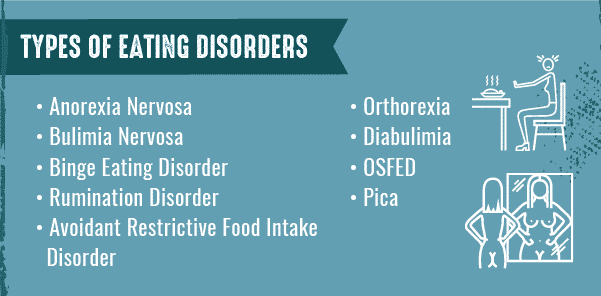Our Eating Disorder Recovery Diaries
Wiki Article
Some Of Eating Disorder Recovery
Table of ContentsAn Unbiased View of Eating Disorder RecoveryEating Disorder Recovery - The FactsTop Guidelines Of Eating Disorder RecoveryThe Only Guide to Eating Disorder RecoveryEating Disorder Recovery Can Be Fun For Everyone

Orthorexia is a type of eating problem, still unacknowledged in the DSM, in which a person comes to be consumed with "healthy consuming." While many individuals make a factor to be familiar with the active ingredients as well as sourcing of their food, orthorexia can end up being damaging to the individual's wellness. Orthorexia creates individuals to identify certain food or food teams as "correct," "healthy," or "pure." At some point, certain foods or entire teams are gotten rid of from the individual's diet; they could additionally begin to obsess over the ingredients in their foods, investing hrs every day planning meals (eating disorder recovery).
Food ingredients might also come to be the person's just topic of discussion. Health repercussions could consist of a selection of intestinal and dietary discrepancies. It can additionally cause a lot of the same wellness dangers as anorexia nervosa, as the person's caloric intake might be severely restricted. Orthorexia is likewise an usual co-occurring disorder connected with OCD.
The Basic Principles Of Eating Disorder Recovery
With this disorder, an individual will purely avoid certain foods to the hinderance of their wellness - eating disorder recovery. Unlike orthorexia, however, the avoidance of certain foods isn't driven by ideas of the food's healthfulness or pureness, however rather by a severe aversion to the food's taste, appearance, or smell (although problems concerning spoilage or food poisoning may also be present).Over time, even more as well as more foods become illogical, resulting in an extremely minimal palette of acceptable foods. Previously recognized as careful eating disorder, ARFID often starts in childhood years and gradually intensifies in time. It's reasonably typical for children to be "picky eaters" as well as everybody has preferences wherefore they eat, but if it comes to be uncontrollable and damaging to a person's wellness, it calls for a check-in with an eating disorder treatment expert.
Also like orthorexia, a negative or altered body photo is not always a source of the condition. ARFID is normally treated making use view publisher site of talk therapy as well as cognitive retraining such as Cognitive Behavior Modification (CBT). Unlike most eating disorders which generally initially present during teenage years, rumination disorder is most typical in early stage and also early childhood years, although it can persist right into their adult years.
How Eating Disorder Recovery can Save You Time, Stress, and Money.
Usually, they do not experience anxiety or disgust when spitting up, neither do they show up to make an initiative to throw up (as seen in bulimia nervosa). Rumination disorder is often a reaction to an irrational anxiety of health problem created by eating, although its causes are less well-understood than other eating conditions.

While lots of people make a factor to be mindful of the active ingredients and sourcing of their food, orthorexia can become harmful to the individual's wellness. At some point, specific foods or entire teams are eliminated from the person's diet plan; they might likewise start to obsess over the components in their foods, spending hours each day preparation meals.
The Single Strategy To Use For Eating Disorder Recovery
:max_bytes(150000):strip_icc()/intuitive-eating-can-help-disordered-eating-4796957_final-7590d424bb6b4626907da407ae8ad4a0.png)
With this condition, an individual will purely stay clear of particular foods to the detriment of their this post health and wellness. Unlike orthorexia, nevertheless, the evasion of particular foods isn't driven by concepts of the food's healthiness or purity, however instead by a severe hostility to the food's flavor, texture, or smell (although worries concerning wasting or food poisoning may likewise exist).
Over time, increasingly more foods become illogical, causing an extremely minimal combination directory of acceptable foods. Formerly understood as selective eating disorder, ARFID usually starts in childhood years and also considerably gets worse with time. It's fairly common for youngsters to be "choosy eaters" and every person has choices wherefore they consume, however if it comes to be compulsive and destructive to an individual's health and wellness, it warrants a check-in with an eating problem therapy expert.
Facts About Eating Disorder Recovery Revealed
Also like orthorexia, an unfavorable or distorted body picture is not always a reason for the disorder. ARFID is generally dealt with utilizing talk therapy and also cognitive re-training such as Cognitive Behavior Modification (CBT). Unlike most eating problems which usually initially existing during teenage years, rumination condition is most usual in infancy and early youth, although it can persist right into the adult years.Normally, they do not experience tension or disgust when regurgitating, neither do they appear to make an initiative to throw up (as seen in bulimia nervosa). Rumination disorder is frequently a response to an unreasonable fear of ailment brought on by eating, although its causes are less well-understood than other eating problems.
Rumination disorder is noted in the DSM-V. Diabulimia is detailed as one of the many unspecified eating conditions under the catchall term OSFED (Various other Specified Feeding r Eating Condition).
Report this wiki page